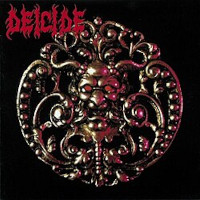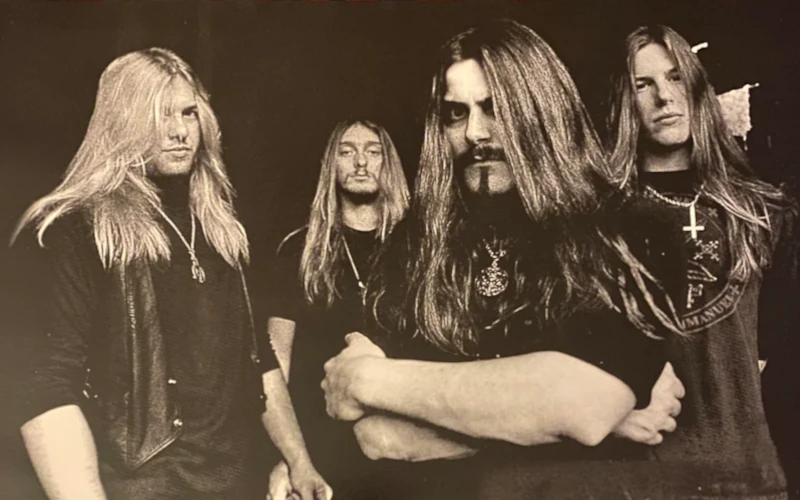Deicide: The Formation and Early Days of Death Metal’s Most Blasphemous Band
In the swampy depths of the late 1980s Florida death metal scene, something evil was brewing. Ferocious, devoutly anti-religious, and destined to become one of the most controversial and extreme metal bands of all time. Before I get too far into this I should stress, Deicide are one of my all-time fave bands. But there’s another aspect to the band besides their music and their obvious distaste for Christianity that I want to explore, and that’s their use of the mainstream media to propel the band from underground cult hero’s into successful musicians who tour the world. Deicide, well more to the point their infamous front man, Glen Benton successfully turned their band into a media Shitstorm the likes of which had never been seen before in the underground earning the band a lot of free publicity, infamy and the chance to make their living playing death metal. A rare feat indeed.
Known for their aggressive Death Metal sound, guttural vocals, and Satanic themes, Deicide helped define the brutal style of American death metal. But before they became infamous, they were just a group of dedicated musicians carving a path through the underground metal movement. Like many of their peers they were finding their sound in the early days and used the occult and satanic themes as a basis for the lyrics aesthetics of the band.
The Origins: From Amon to Deicide
Deicide’s roots begin in Tampa, Florida, the epi-center of 1980s death metal. In 1987, the band formed under the name Carnage then changed their name to Amon, led by brothers Eric and Brian Hoffman (guitars), Steve Asheim (drums), and Glen Benton (bass/vocals).
Amon’s early demos, Feasting the Beast and Sacrificial, spread quickly through tape-trading circles and earned them a cult following. Despite the rawness of their early demo tapes the band gained a cult following in Flordia with over the top live shows (the shows sometimes involving the band throwing out rotten meat into the crowd). Their sound—raw, fast, and extreme captured the spirit of a genre still in its infancy.
The Name Change and Signing with Roadrunner Records
Their ferocious sound and provocative themes caught the attention of Roadrunner Records, who quickly signed them. With legendary producer Scott Burns behind the console at Morrisound Recording Studios, Deicide was ready to unleash their fury. In 1989, the band changed their name from Amon to Deicide—literally meaning “the killing of a god” right before the release of their debut album. It was a fitting title for a band steeped in blasphemous imagery and Satanic ideology, but also a masterstroke in publicity and brand awareness.
The Debut Album: “Deicide” (1990)
Released in 1990, their self-titled debut Deicide became an instant classic in the death metal world. Tracks like “Sacrificial Suicide” and “Lunatic of God’s Creation” mixed unrelenting blast beats with guttural vocals and anti-Christian lyrics.
The album was controversial, fast, and undeniably intense, Earning both acclaim from fans and condemnation from religious groups. It would go on to become both a cult fave and one of the best-selling death metal albums of all time.
 |
Click on the album cover to see a more detailed review of Deicide’s debut release |
Glen Benton: The Voice and Face of Deicide
Glen Benton would quickly become the lightning rod of the band. With an unholy set of lungs and vocal chords and outspoken anti-religious views basically turned him into a walking question mark which the media lappped up. This in turn spread the word about Deicide across the world and rebellious teens the world over lapped it up. Benton embodied the anti-Christian Death Metal scene coming from Flordia. Whilst not the first in the scene to use anti-reglious themes and imagery (other bands like Morbid Angel and Nocturnus were doing it earlier) Benton took it to a new extreme and became a poster boy for the Death metal scene. Much of this was due to his inflammatory commentary and extreme image. Before the recording of their second album Benton branded an inverted cross into his forehead, thus also branding him as a walking abomination in the eyes of Christians and the media alike. This ended up being a master stroke of publicity related brilliance. Benton’s on-stage presence and inflammatory interviews created as much buzz (probably more so) as the music itself, propelling Deicide into headlines and controversies for decades to come.
Controversy and Public Reaction
Deicide became notorious not just for their sound but for the chaos and controversy that followed them. Their lyrics and imagery drew fire from religious leaders, who frequently protested their concerts. In some cases, albums were banned or shows cancelled due to public outcry. One show was even cancelled in the UK due to a small explosion going off reportedly planted by an Animal rights activist after Benton said something about sacrificing animals (one would assume in jest) in a magazine.
But for their fans, Deicide represented freedom of expression and a rejection of religious hypocrisy. Controversy became their fuel—and their brand.
Live Performances and Reputation
In the early ’90s, Deicide built a reputation for intense, chaotic live shows. Benton’s stage presence, the Hoffman brothers’ searing riffs, and Asheim’s thunderous drumming turned every gig into a sonic assault. The live shows established drummer Steve Asheim as one of the best drummers in death metal and Brothers Brian and Eric Hoffman pumped out some of the most ferocious riffs the scene had heard. Thankfully the live shows were able to back up the intense publicity the band had generated.
Legacy of the Early Years
The early years of Deicide—rooted in the Tampa underground—set the stage for decades of extreme metal influence. Their unapologetic lyrics, aggressive musicianship, and controversial image made them stand out in a crowded genre.
Though often criticized for their shock value, Deicide’s early contributions to death metal are undeniable. They weren’t just participants—they were provocateurs, iconoclasts, and pioneers.
